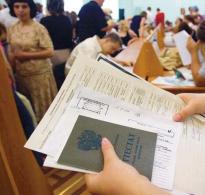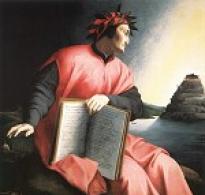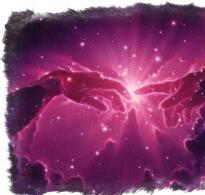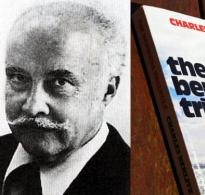(Short biography). Maykov A.N. (Short biography) Homecoming
Maikov Apollon Nikolaevich (1821-1897), poet.
Graduated from the Faculty of Law of St. Petersburg University. Maykov's first book of poems was published in 1842. Then the poem "Two Fates" (1844) and "Mashenka" (1846), a collection of lyrics "Essays on Rome" (1847), reflecting the impressions of a trip to Italy, were published. .
In 1848-1852. the activity of the poet has noticeably decreased.
The Crimean War, which began in 1853, again awakened him to intense creative activity (the result was the book "1854. Poems").
Poems from the late 50's and 60's. Maikov tried to critically assess the surrounding reality ("Whirlwind", 1856; "He and She", 1857; poem "Dreams", 1856-1858; collection "Neapolitan Album", 1858-1860; poems " Fields”, 1861, “To Friend Ilya Ilyich”, 1863, “On the White Shoal of the Caspian Sea...”, 1863, etc.). In the same years, he translated a lot from modern Greek folk poetry, imbued with the spirit of the struggle for independence.
A sympathetic attitude towards the national liberation movement also dictated a number of translations from Serbian youth songs (for example, “The Saber of Tsar Vukashin”, “Serbian Church”, “Radoytsa”, “Horse”), hence the poet and the period of the Tatar invasion of Russia and the struggle with nomads (“In Gorodets in 1263”, “Clermont Cathedral”).
In 1870, Maykov's translation of The Tale of Igor's Campaign was published - the result of four years of hard work.
In 1875 Maykov wrote the poem "Emshan" - an adaptation of one of the legends of the Ipatiev Chronicle. The poet had an enduring interest in the era of the clash of paganism with Christianity (“Olinth and Esther”, “Three Deaths”, the tragedy “Two Worlds”, etc.).
Despite the genre and thematic richness, Maykov's poetic heritage is unified in terms of style. Maikov's poetry captures with harmonic fusion
thoughts and feelings, impeccable artistic taste, melodiousness and musicality. It is no coincidence that in terms of the number of poems set to music, Apollon Nikolaevich occupies one of the first places among Russian poets of the 19th century.
- Literature or painting?
“My whole biography is not in external facts, but in the course and development of my inner life ...” - said the poet. The lyrics of Apollo Maykov were a reflection of his life - hobbies, political views and historical events that he witnessed.
Literature or painting?
Apollo Maykov was born into a noble family. He inherited his love for art from his parents, representatives of the creative intelligentsia. Father, Nikolai Maikov, was an academician of painting, mother, Evgenia Maikova, was a writer and poetess. “Maikov’s house was seething with life, people who brought here inexhaustible content from the sphere of thought, science, and art,” recalled the writer Ivan Goncharov, who gave literature and Russian language lessons to the family.
Growing up in such an environment, Apollon Maikov was sure that he would devote his life to art. He was equally gifted in both literature and painting, but he decided to opt for poetry for two reasons: his youthful poems were highly appreciated by the literary historian Alexander Nikitenko and the poet Pyotr Pletnev, and developing myopia prevented him from devoting enough time to painting.
"His poems are reminiscent of ancient poets"
Enrolling in 1837 at the law faculty of St. Petersburg University, Apollon Maykov began to study ancient Greek and Roman history. This passion influenced his work. Contemporaries wrote: "He seems to look at life through the eyes of a Greek, his poems are reminiscent of ancient poets, they have a bright and optimistic beginning."
Maykov's first works were published in the late 1830s. In 1842, his first poetry collection was published. “A poetic, full of life and certainty language” - this is how Vissarion Belinsky commented on the book of the young poet. Admiring Maykov's work "Dream", the critic wrote: "Pushkin himself would have had this poem from his best anthological plays."
For this collection, Apollon Maykov received an allowance from Emperor Nicholas I. With the money he received, he went on a trip to Europe, which lasted almost two years. The poet visited Italy, France, Austria and other countries.
He shared his impressions of the trip with readers in a new collection - Essays on Rome, published in 1847 in St. Petersburg. Literary critics noted that his work has changed: from antiquity, he moved on to modern life, he began to be more interested in the poetry of "thoughts and feelings."
Ivan Kramskoy. Portrait of Apollo Maykov fishing. 1883

Apollo Mike. River landscape. 1854

Vasily Perov. Portrait of Apollo Maykov. 1872
Petrashevsky circle and natural school
Returning to the capital in 1844, Apollon Maykov became a prominent figure in the literary circles of St. Petersburg. He actively collaborated with the magazines Sovremennik and Otechestvennye Zapiski, and was friends with Vissarion Belinsky, Nikolai Nekrasov and Ivan Turgenev.
With the help of his brother, Valerian, Apollo also got to the meeting of the first socialist circle in Russia, organized by Mikhail Petrashevsky. There, the poet began a close acquaintance with Fyodor Dostoevsky and Alexei Pleshcheev. Although Maikov did not share all the views of the natural school, the influence of this literary movement still affects his work. The poems of the 1840s are full of civic motifs. Maikov published his poems in the journal Otechestvennye Zapiski by Andrey Kraevsky, and in 1845 he wrote the poem Two Fates, for which he received the Pushkin Prize of the Academy of Sciences. In 1846, the poem "Mashenka" was published in the "Petersburg Collection" by Nikolai Nekrasov.
... On the shelf of a book - yes, about a person
You can probably conclude
According to his chosen library,
In his soul, in concepts to read, -
Goldoni's comedies lay there,
History of the Madonna and Saints,
Opera libretto, poems by Tassoni
Yes, the calendar of temple processions ...Apollo Mike. Excerpt from the poem "Two Fates" (1845)
When many members of the Petrashevsky circle were exiled, Maikov changed his attitude towards the revolutionary movement in Russia. Later, in notes to the poet Yakov Polonsky, he spoke of his “liberal period”: “A lot of nonsense, a lot of selfishness and little love. It was my stupidity, but not meanness.
Slavophiles and "pure art"
Since the 1850s, Apollon Maikov has become close to the editors of Moskvityanin, and conservative sentiments are increasingly felt in his work. Maikov shared the Slavophile ideas of Mikhail Pogodin (magazine publisher), Mikhail Katkov, Fyodor Tyutchev. During this period, the poet opposed the influence of Western European culture. He wrote a lot about the beauty of Russian nature. These poems, according to the publicist Mikhail Borodkin, "were memorized almost with the first prayers." Many of Maikov's works were set to music
Biography
Apollo Nikolaevich Maykov (May 23 (June 4), 1821, Moscow - March 8 (20), 1897, St. Petersburg) - Russian poet, corresponding member of the St. Petersburg Academy of Sciences (1853).
Born in 1821. In Moscow. The son of the nobleman Nikolai Apollonovich Maikov, painter and academician, and writer Evgenia Petrovna Maikova; elder brother of literary critic and publicist Valerian Maikov, prose writer and translator Vladimir Maikov, and literary historian, bibliographer and ethnographer Leonid Maikov. In the summer he lived in the estate of his grandmother in the Moscow region, near the present Solnechnogorsk, the village of Chepchikha.
In 1834 the family moved to St. Petersburg. I. A. Goncharov was the home teacher of the Maykov brothers. In 1837-1841. studied at the Faculty of Law of St. Petersburg University. At first he was fond of painting, but then devoted to
Having received allowance from Nicholas I for a trip to Italy for the first book, he went abroad in 1842. Having seen Italy, France, Saxony and the Austrian Empire, Maykov returned to St. Petersburg in 1844 and began working as an assistant librarian at the Rumyantsev Museum.
In the last years of his life he was a real state councilor. Since 1882 - Chairman of the Foreign Censorship Committee.
February 27, 1897 Maykov went out into the street too lightly dressed and fell ill. Died March 20, 1897. He was buried at the cemetery of the Resurrection Novodevichy Convent.
Creation
The first publications were usually considered the poems "Dream" and "Picture of the Evening", which appeared in the "Odessa Almanac for 1840" (1839). However, the debut of the 13-year-old Maykov was the poem "Eagle", published in the "Library for Reading" in 1835. The first book "Poems of Apollo Maykov" was published in 1842 in St. Petersburg. He wrote poems (“Two Fates”, 1845; “Princess”, 1878), dramatic poems or lyrical dramas (“Three Deaths”, 1851; “Wanderer”, 1867; Two Worlds, 1872), ballads (“Emshan”, 1875) . Published in magazines: Otechestvennye zapiski, Library for reading. Maykov's liberal moods of the 40s (the poems "Two Fates", 1845, "Mashenka", 1846) were replaced by conservative views (the poem "Carriage", 1854), Slavophile and pan-Slavist ideas (the poem "Clermont Cathedral", 1853); in the 60s, Maykov's work was sharply criticized by the revolutionary democrats. Maykov's aesthetic position also underwent changes: a short-term rapprochement with the natural school gave way to an active defense of "pure art".
Maikov's lyrics often contain images of the Russian village, nature, Russian history; also reflects his love for the ancient world, which he studied for most of his life. Maikov's poems about Russian nature, created in 1854-1858, became textbooks: “Spring! The first frame is exhibited”, “Summer Rain” (1856), “Haymaking”, “Swallow”, “Niva” and others. Many of Maykov's poems were set to music by N. A. Rimsky-Korsakov, P. I. Tchaikovsky and others.
For four years he translated in poetic form "The Tale of Igor's Campaign" (the translation was completed in 1870). He was also engaged in translations of folk poetry in Belarus, Greece, Serbia, Spain and other countries. translated works such poets like Heine, Mickiewicz, Goethe. Translated chapters IV-X of the Apocalypse (1868).
In addition to poetry, essays and book reviews, he also wrote prose, which is not significant. After 1880, Maikov practically did not write anything new, being engaged in editing his works for the preparation of a collected works.
Selected editions and works
"Poems of Apollo Maykov" (1842)
Poem "Two Fates" (1845)
Poem "Mashenka" (1846)
Poem "Savonarola" (1851)
Poem "Clermont Cathedral" (1853)
The cycle of poems "In an anthological kind"
Cycle of poems "Centuries and peoples" (1854-1888)
Cycle of poems "Eternal Questions"
Cycle of poems "Neapolitan Album"
Cycle of poems "Modern Greek Songs" (1858-1872)
Cycle of poems "Reviews of history"
Cycle of poems "Essays on Rome"
Drama "Two Worlds" (1872)
Drama "Three Deaths" (1851)
Drama "The Death of Lucius" (1863)
Complete Works (1893)
Maikov Apollon Nikolaevich (1821 - 1897), poet.
Born on May 23 (June 4 NS) in Moscow in an old noble family with rich cultural traditions. His father was a famous painter, academician of painting. Childhood years were spent in a Moscow house and estate near Moscow, which were often visited by artists and writers.
The artistic atmosphere of the house contributed to the formation of the spiritual interests of the future poet, who early began to draw and write poetry.
Since 1834, the family moved to St. Petersburg, and the further fate of Maykov is connected with the capital.
In 1837 - 1841 he studied at the Faculty of Law of St. Petersburg University, without leaving literary studies. After graduating from the university, he served in the Department of the State Treasury, but soon, having received an allowance from Nicholas I for traveling abroad, he left for Italy, where he studied painting and poetry, then to Paris, where he listened to lectures on art and literature. He visited both Dresden and Prague.
His first poetry collection was published in 1842 and was highly appreciated by V. Belinsky, who noted "a talent, genuine and wonderful." The collection was a great success.
Impressions from a trip to Italy are expressed in Maikov's second collection of poetry, Essays on Rome (1847).
During these years, he became close to Belinsky and his entourage - Turgenev and Nekrasov, visited the "Fridays" of M. Petrashevsky, maintained a close acquaintance with F. Dostoevsky and A. Pleshcheev. Although Maikov did not fully share their ideas, they had a certain influence on his work. His works, such as the poems "Two Fates" (1845), "Mashenka" and "The Young Lady" (1846), contain civic motifs.
From 1852 Maikov took the place of censor in the Committee of Foreign Censorship and since then, for more than forty years, has served in this department. At the same time, he became close to the Slavophiles, imbued with their ideas and gradually moved away from the liberals and radicals, becoming a zealous defender of the "firm" monarchical power and the Orthodox religion. He more consistently switched to conservative positions, as evidenced by the poem "Clermont Cathedral" published in 1853 and the cycles "Neapolitan Album" and "Modern Greek Songs" published in 1858 (after a trip to Greece). The Peasant Reform of 1861 met with enthusiastic poems "Fields", "Niva". Finally opposing his understanding of art to the ideas of revolutionary democrats, he became a supporter of "art for art's sake", which caused sharp criticism from Saltykov-Shchedrin and satirical parodies of Dobrolyubov.
Fascinated by the era of Ancient Rus' and Slavic folklore, Maykov created one of the best translations of The Tale of Igor's Campaign.
Based on the history of Ancient Rome, he wrote the philosophical and lyrical drama "Two Worlds", which was awarded the Pushkin Prize by the Academy of Sciences in 1882. If earlier the poet was attracted to antiquity, now his interest has shifted to Christianity as a new moral teaching that opposes the aestheticism of paganism.
Maykov's best creations include his landscape lyrics: "Haymaking", "Under the Rain", "Swallows", etc., which are distinguished by sincerity and melodiousness. Many of his poems inspired composers to write romances. In 1893, his three-volume collected works, the sixth in a row, were published, completing his sixty-year literary activity.
Apollon Nikolaevich Maykov was born in Moscow on June 4 (May 23, old style), 1821. Apollo Maykov's father, Nikolai Apollonovich Maykov, was a talented artist who reached the title of academician of painting, and his mother, Evgenia Petrovna, wrote books. The artistic atmosphere of the parental home contributed to the formation of the spiritual interests of the boy, who early began to draw and write poetry. His teacher of literature was the writer I.A. Goncharov. As a twelve-year-old teenager, Maykov was taken to St. Petersburg, where the whole family soon moved.
Almost all family members tried their hand at literature. An idea arose to publish a handwritten journal, which was called simply and beautifully "Snowdrop".
Issues of "Snowdrop" were stitched together and decorated with a massive red cover with gold stamping.
In 1837, A. Maikov entered the law faculty of St. Petersburg University. Studies in Roman law aroused in him a deep interest in the ancient world, which later manifested itself in his work. Maykov was fluent in several languages, including Latin and ancient Greek.
The debut of A.N. Maikov as a poet took place in 1841. He became a famous poet of his time. Maikov is a painter of the word, the creator of beautiful poems about his native nature. He is the translator of the immortal monument of antiquity "The Tale of Igor's Campaign".
The poet's poems were included in all school anthologies in Russia.
In his declining years, Apollon Nikolaevich acquired a modest dacha in the vicinity of St. Petersburg at the Siverskaya station of the Warsaw Railway. Here, as noted by his contemporaries, "he found his honor and his place", engaging in charitable activities. Thanks to his efforts and efforts, a church, a school and a library-reading room, bearing the name of the poet, were built in Siverskaya.





